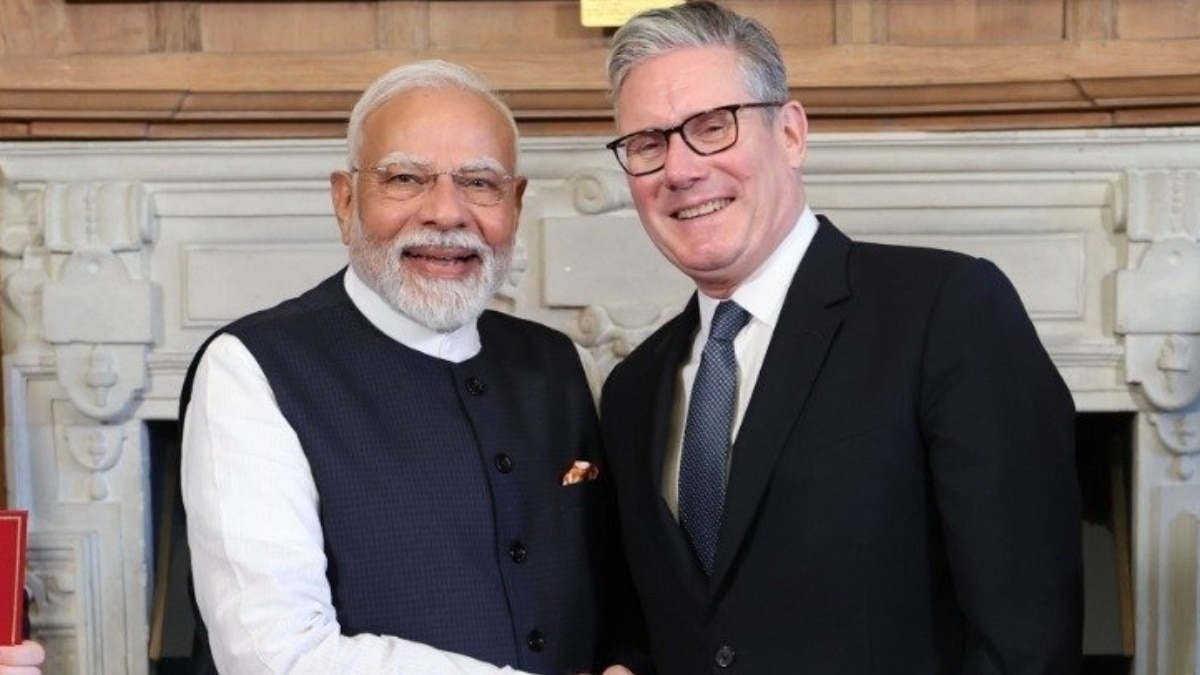India and the UK signed a landmark trade deal on Thursday to boost two-way trade by eliminating tariffs on cars, textiles, whisky and a range of other products. Prime Minister Narendra Modi and his UK counterpart Keir Starmer firmed up the ‘Vision 2035’ strategy to expand ties in defence, technology, clean energy and migration.
The historic trade deal is expected to provide comprehensive market access for Indian goods across all sectors. India will benefit from tariff elimination on about 99 per cent of tariff lines covering almost 100 per cent of trade values. Modi said the agreement is more than an economic partnership; it is a blueprint for shared prosperity. It will enhance market access in the UK for Indian textiles, footwear, gems and jewellery, seafood, and engineering goods. It will also create new opportunities for India’s agricultural produce and processed food industry. The deal will especially benefit India’s youth, farmers, fishermen, and the MSME sector. He added that UK products such as medical devices and aerospace parts will be available to Indian people and industry at accessible and affordable rates.
The trade deal has been hailed by India Inc as a ‘transformative moment’.
Anil Agarwal, Chairman, Vedanta, said a lot of hard work has gone into drawing up the India-UK trade deal. “The FTA will be a win-win for both countries. It will boost economic activity and create many more jobs, and opportunities for entrepreneurship, in both countries. This will help both the countries to increase the trade by at least $20 billion. I have closely seen the economic engagement between India and the UK grow substantially over the last two decades. We make a great partnership, be it trade, investment or people to people links.”
Ajay Piramal, Chairman and Executive Director at Piramal Enterprises, said “The India-UK FTA is more than a trade agreement – it’s a catalyst for job creation, youth empowerment, and building a future-ready workforce. For the Indian industry, it represents a meaningful step toward inclusive, sustainable economic growth with global partnerships at its core.”
Anish Shah, Group CEO & MD, Mahindra Group called it a “transformative moment in the global economic landscape”. “It’s not just a win for trade, but a blueprint for a modern, values-led partnership that puts innovation, sustainability, and inclusive growth at the heart of global collaboration,” he said, adding that the deal has the power to unlock economic potential, create high-quality jobs, and accelerate progress in future-facing sectors such as green mobility, green energy and digital technologies.
Sudarshan Venu, Managing Director, TVS Motor Company said, “The signing of the India-UK Free Trade Agreement is a pivotal moment — it opens new frontiers for Indian companies to take ‘Make in India’ to the world.”
Rudra Kumar Pandey, Partner, Shardul Amarchand Mangaldas & Co, said, ’The India–UK FTA represents a landmark framework that enhances India’s trade facilitation architecture. By offering duty-free access on 99% of Indian tariff lines and incorporating robust provisions on digital trade, mobility, and services liberalisation, the agreement significantly advances market access commitments. It also creates a more predictable environment for SMEs and foreign investors, reinforcing India’s credibility as a rule-based manufacturing and supply chain partner aligned with its broader economic objectives.”
Anand Ramanathan, Partner, Consumer Products, and Retail Sector Leader, Deloitte India said, “The India-UK FTA is poised to unlock significant opportunities across key consumer sectors. In alco-be, the biggest beneficiary will be UK-based Scotch brands, with high import tariffs seeing a sharp reduction. Given India’s evolved whisky-drinking market, this will encourage both established players and new entrants to expand their global portfolio offerings here. The cosmetics sector too will see a boost, particularly with the harmonization of standards enabling smoother market access. Interestingly, this also opens doors for Ayurvedic and natural ingredient-based products both from India to the UK and vice versa. In apparel and textiles, the tariff cuts will enable UK premium and luxury fashion brands to price more competitively, making India a highly attractive retail market.”
Neha Aggarwal, Partner, Deloitte India added, “The FTA is poised to unlock major opportunities for Indian exports of generics and medical devices with reduced tariffs, faster regulatory approvals, and a balanced IP regime ensure that Indian manufacturers can scale competitively in the UK market. UK companies would similarly benefit with improved market access and IP protection regime.”
The Comprehensive Economic and Trade Agreement (CETA), signed by Commerce Minister Piyush Goyal and UK counterpart Jonathan Reynolds in the presence of the two prime ministers, aims to enhance bilateral trade by around $34 billion annually and ensure better market access.
Starmer said the trade deal will lower prices on Indian goods including clothes, shoes and food. He called the deal a major win for Britain that will create thousands of British jobs, unlock new business opportunities and drive growth across the country.
The trade pact is Britain’s biggest since its exit from the European Union and comes amid global concerns over US President Donald Trump’s tariff disputes. Both sides have also agreed to negotiate a Double Contribution Convention (DCC) to exempt employers of Indian workers from paying social security contributions in the UK for up to three years. The DCC will come into effect along with the CETA.






